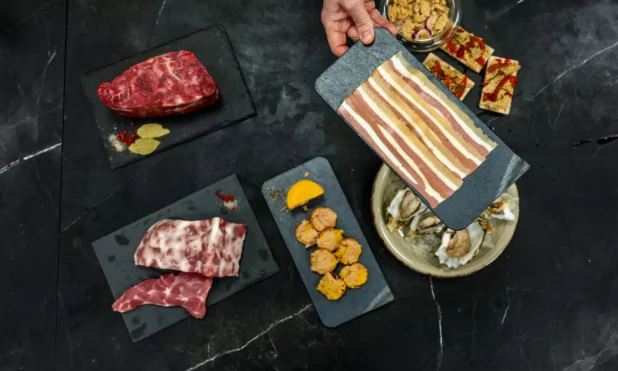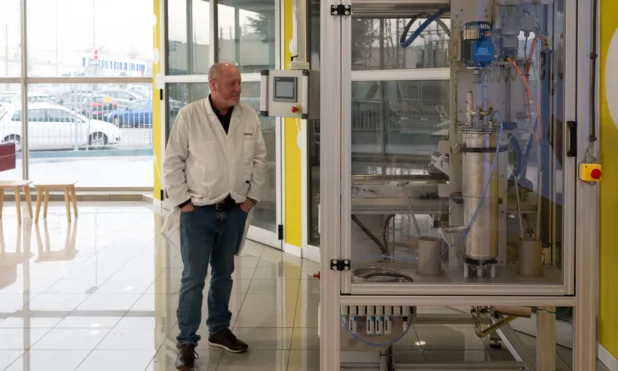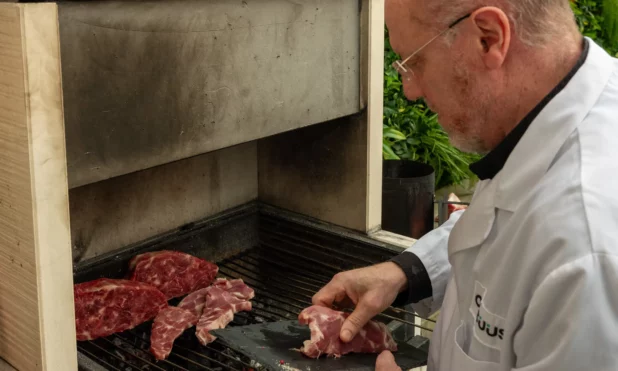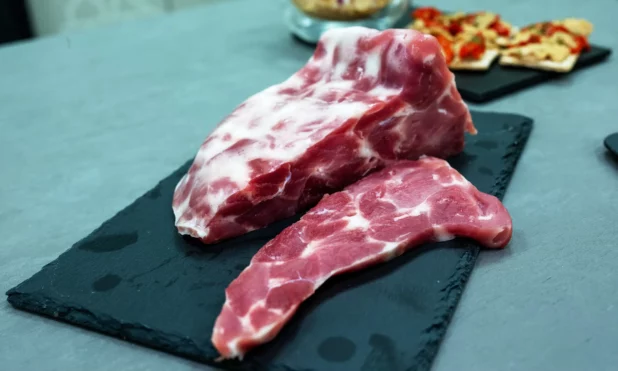It’s all fake.
It doesn’t matter if you’re pissed off about this. Restaurants and supermarkets will start serving it to you against your will.
You won’t even know. You don’t read the packages of food. No one does.
By the time you find out you’ve been eating this crap, you’ll have been eating it for months, and by that point, you won’t care.
“We knew that if we were going to print something, it needed to be something that would piss people off,” says Larumbe, who left a €100,000-a-year job in construction materials to devote himself to the startup.
“We knew that printing a big steak would piss a lot of people off in Spain – and especially in the north of Spain. So we printed the steak and put it on Facebook and Twitter and LinkedIn. We got 700,000 replies. Most of them were people telling us to stick it up our arses. It was crazy and we were absolutely delighted.”
Patxi Larumbe with a 3D machine that produces prawns.
Better still, it also attracted the attention of the US food company Cargill, which is now one of Cocuus’s main investors. Over the past few years, the Spanish firm – which also specialises in the formulas and machinery behind the printed foods – has designed and made multi-nozzled printers that can create foods that mimic the taste and texture of a meat and fish. Its hardware can also produce meals that stimulate the eyes and appetites of people who have difficulty swallowing by painting moulded purees to make them look like a plate of chicken and chips, or hake and peas.
Larumbe cooking his fake meat.
While Cocuus’s bacon and foie gras is made from a thick vegetable paste, its steak contains real beef from the 50kg of meat that are discarded or turned into cat food when a cow is slaughtered. The fat that marbles the steak is made from a vegetable mixture, making it far lower in saturated fat than the real thing.
Larumbe, who exudes confidence in his products as surely as his printers extrude meat and vegetable paste, gives short shrift to many of his putative rivals, dismissing the vegan burger boom of recent years as “a bubble” and pointing out the massive expense and low yields of lab-grown meat.
Asked what sets his company apart in an already crowded field, he insists it comes down to scale. Cocuus and its partner Foody’s have sold 80,000 units of their meat-free foie gras and 200,000 units of cholesterol-free vegan bacon since the products appeared on the shelves of Carrefour stores last September. Cocuus also has the production capacity at its factory in the city of Tudela to turn out 1,000 tonnes of bacon and 3,000 tonnes of foie gras a year.
“We’re the first company in the world that has managed to do this on an industrial, rather than an experimental, scale,” says Larumbe.
“Second, our imitation is total – that hasn’t existed until now. You had things for vegetarians, but they were bad. Third, we have scientists here that are coming up with formulas and technologies that are radically different. All of that means that we’re the most advanced company in the world in this field and one that’s working with the biggest international food companies.”
I just hope it works to change the weather.
You have to eat fake stuff because you changed the weather.
 Daily Stormer The Most Censored Publication in History
Daily Stormer The Most Censored Publication in History






